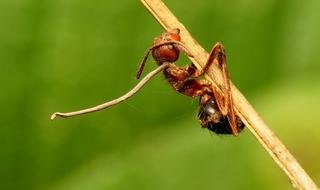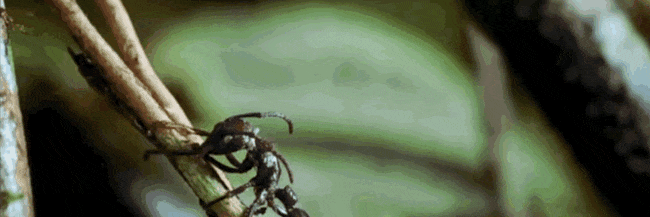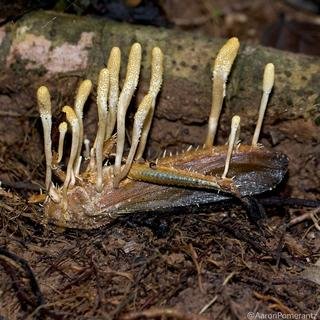Consider the bullet ant. A fairly formidable insect, native to Central America, its bite is said to be as painful as a being shot by a bullet. That sounds like an exaggeration to me, but I wouldn’t like to test it. These ants live in relatively small colonies, and they are tough little creatures, hard working and fearless. Like all ants, they have a job, and they stick to the plan. The workers work, leaving the nest to forage for food to sustain the colony. They will do this for their entire lives. Evolution has spent millions of years perfecting them, and they are efficient and selfless members of their collective.

Unless they are unfortunate enough to be infected by the cordyceps fungus. In this instance, the unlucky ant will change its behaviour entirely, and will climb, zombie-like, the nearest plant (something that it would never usually do), clamp its jaws onto a leaf or a branch and then slowly die. But this isn’t the end of the story. The fungus will then grow within the ant, boring itself through the head, and growing a “branch” in a process that will take about three weeks.

After this is completed, the fungus will drop spores below, onto the home nest of the zombie ant, infecting much, if not all of the colony, often killing it entirely as a zombie ant army is created. This incredible process was captured by the BBC, and can be viewed here.
It already sounds like a nightmarish science-fiction story, but new research seems to indicate that it is actually worse than originally thought. It seems that the brain of the ant is not directly affected by the fungus, rather that the muscular function is hijacked, leaving the ant “conscious” and “aware” (obviously these concepts are loosely applied to an insect!) as its body, as if being controlled by strings, turns traitor, and climbs the nearest plant.

Cordyceps has about 400 different species, and each one targets one particular creature. The bullet ant is just one example – locusts, grasshoppers, caterpillars and crickets are all victim to the appalling effects of the cordyceps fungus. This startling example of biodiversity is an amazing example of the complexity of evolution. Over millions of years, this incredible fungus has developed and thrived by utilising this remarkable process of reproduction.
The actual mechanics of the complex process are still being understood, but just take a moment to consider how fantastical it is that tiny spores from a tiny fungus can infiltrate an entirely different species and hijack its entire being, to be used as a weapon to wipe out entire colonies of creatures. For no other reason than to exist and spread.
Nature. WTF?


Very cool and interesting story. Ants can be quite nasty. I had quite a bit of experience with fire ants when I was living in Florida. If you got anywhere near their nest, they would swarm you. You won't know they were on you until you felt the burn. The next day the bites would pus up and itch. Too bad cordyceps didn't target fire ants!
Downvoting a post can decrease pending rewards and make it less visible. Common reasons:
Submit
Well, I had a look on Google and the best answer I can give you is that fire ants might be a cordyceps victim! Your response triggered a childhood memory in me. I was in the back garden - I would have been about 4 - playing with the girl across the road, sitting at a table, and I looked down to see an entire ant army marching up my legs. Cue hysteria! The laws of phobias suggest I should hate the little feckers, but I have to say I find them fascinating.
Thanks for stopping by!
Downvoting a post can decrease pending rewards and make it less visible. Common reasons:
Submit
OMG that is scary. They should eradicate that fungus before it infects humans!!!
Downvoting a post can decrease pending rewards and make it less visible. Common reasons:
Submit